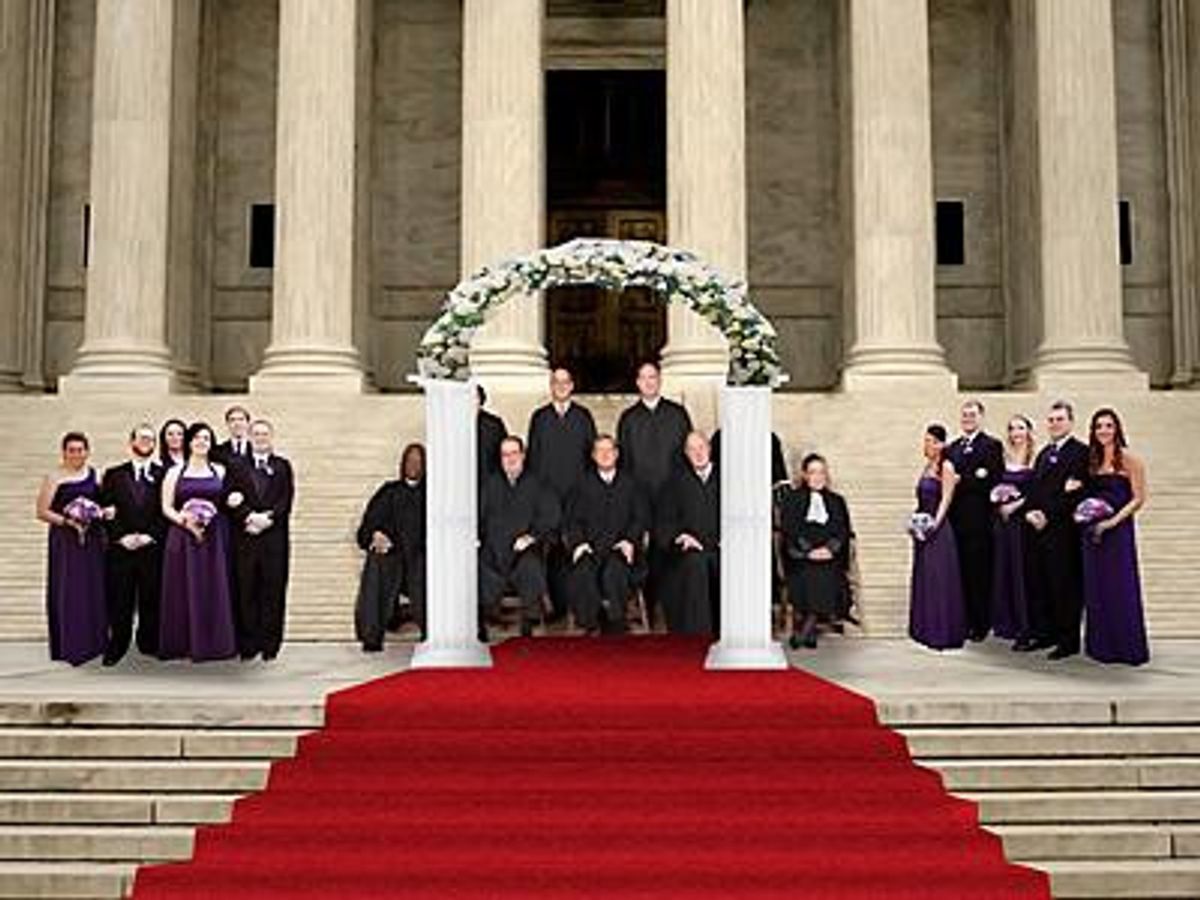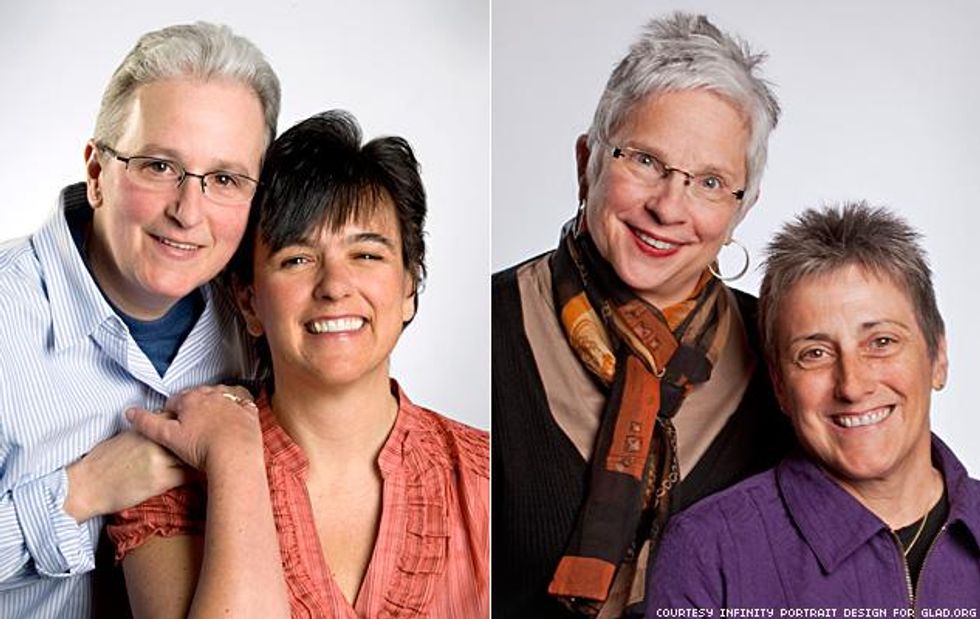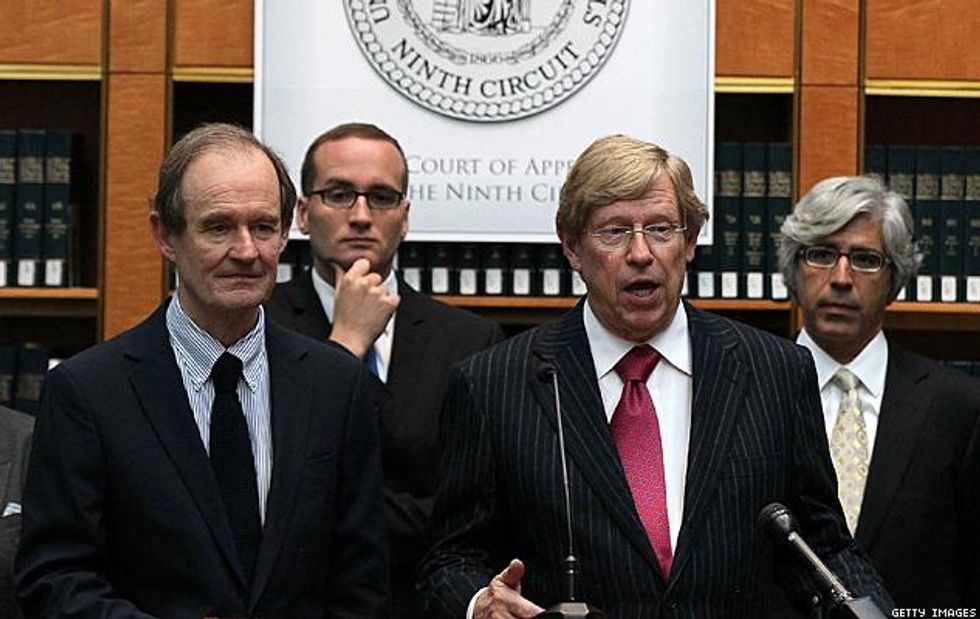
Several very different marriage court cases are headed to the Supreme Court -- but not all are likely to go our way.
September 24 2012 4:00 AM EST
November 17 2015 5:28 AM EST
By continuing to use our site, you agree to our Private Policy and Terms of Use.

How cool would it be if you could get married in your state -- and be treated as married in all of the United States? This term, the Supreme Court might very well bring us one step closer to that promised land. SCOTUS will almost certainly hear a challenge to 1996 Defense of Marriage Act -- and if it does, most observers believe it will declare DOMA's section 3 unconstitutional. That's the part that says that, for federal purposes, the definition of marriage is a union between one man and one woman, no matter what your home state says. As I write this, several DOMA challenges are on appeal to our top court; and the justices will soon be considering which ones to accept -- but we don't yet know how they'll decide.
The court might also decide to review Perry v. Brown, the California Proposition 8 case that -- while not a DOMA case -- is about (depending on who's interpreting it) whether same-sex couples have a fundamental right to marry or whether voters can vote to take away a court-appointed constitutional right based on nothing but bias and hatred. Perry is the case brought by the celebrity legal team of Ted Olson and David Boies. And while LGBT advocates want the Supremes to take a DOMA challenge (or two), many really, really, really hope they do not take Perry.
Bring On the Cases
Why? Because the legal questions in the five DOMA cases are more limited -- and therefore easier for the Supreme Court to decide in our favor. In all of them, same-sex couples are already lawfully married in their home states and are suing the U.S. because of the cost of being defined federally as single. In the DOMA cases our advocates will be asking the Supreme Court, Does the federal government have the right to pick and choose which state marriages it will recognize, or is that unconstitutional, violating the U.S. Constitution's promise that each American will be protected equally by the law? There's another technical question heading up to the court at the same time, which the justices will probably duck: Do LGB folks ("T" isn't under official consideration here, although they'll be affected) deserve to be called a legal "protected class," so that any law that hinges on sexual orientation has to have an extra-super-duper-good reason, lest it be struck down?
Of the five DOMA cases on appeal to the Supreme Court, two Massachusetts cases are farthest along legally: Gill v. Office of Personnel Management, filed by Gay and Lesbian Advocates and Defenders, and Commonwealth of Massachusetts v. Department of Health and Human Services, filed by the state attorney general's office. In Gill, first filed in March 2009, GLAD originally represented 19 people who had experienced an array of the ways that DOMA harms lawfully married same-sex couples: They had to buy extra health insurance, paid more in federal taxes, were denied a federal pension, and so on.
The Massachusetts AG's office added two arguments. First, historically the states have been in charge of marriage and family law -- and therefore DOMA is an unprecedented federal power grab, unconstitutionally taking over states' responsibilities. Second, DOMA unconstitutionally forces Massachusetts to discriminate against its own citizens, for instance, by forcing the commonwealth to treat married lesbians and gay men as single for such purposes as Medicaid and Medicare.
As has been true in every DOMA case since, the federal trial court judge in the Massachusetts cases, Joseph L. Tauro, found DOMA section 3 unconstitutional. The First Circuit Court of Appeals agreed, although in far more limited terms, using arguments aimed squarely at the presumed Supreme Court swing vote, Justice Anthony Kennedy. And because it was striking down a federal law -- which almost always means the Supreme Court will weigh in -- Judge Michael Boudin, who wrote the First Circuit opinion, put a hold on his ruling until the Supremes could make the final decision.
But will the Supreme Court take the Massachusetts cases, or will it take one of the three other DOMA challenges currently alive in the Second and Ninth Circuits? This summer, the Department of Justice asked the Supreme Court to hear not just the Massachusetts cases but also Lambda Legal's California case Golinski v. Office of Personnel Management -- which won at the trial court but hasn't yet been heard by the Ninth Circuit Court of Appeals. The Department of Justice essentially said to the Supreme Court: Hey, you're going to decide this in the end, so please consider this one too.

GLAD'S LEADING LADIES The leading plaintiffs in Gill v. Office of Personnel Management and Pedersen v. Office of Personnel Management, (from left) Nancy Gill, Marcelle Letourneau, Joanne Pedersen, and Ann Meitzen.
Why would DOJ do such a thing? As you may remember, in February 2011 the Department of Justice announced that it believed DOMA was unconstitutional -- that was a big deal -- and that it would no longer defend the law in court. The John Boehner-led House of Representatives ordered the Bipartisan Legal Advisory Group to take up the defense, spearheaded by high-profile constitutional lawyer Paul Clement. DOJ has been fighting on our side since then. Why might it ask the Supremes to jump ahead of the Ninth Circuit (which, being the most liberal appeals circuit, will probably strike down DOMA section 3) and take a California case alongside the Massachusetts cases?
I've heard two reasons. Several experts think it's because Justice Elena Kagan, who was Obama's solicitor general when the Massachusetts cases were under way, might feel compelled to recuse herself, which could leave a 4-4 court. Gary Buseck, GLAD's legal director, thinks that she needn't, but he won't take bets. Buseck thinks DOJ asked the Supremes to take Golinski for another reason: consistency. In the Massachusetts cases, DOJ was for DOMA at the trial court -- but was against it on appeal. That means BLAG can use DOJ's own arguments against it. In Golinski, by contrast, DOJ always argued against DOMA and for a higher standard of review -- a standard that Golinski trial court judge Jeffrey S. White granted in his decision. (Both DOJ and BLAG declined to comment on ongoing cases.)
After DOJ asked to have Golinski go straight to the top, no one wanted to be left behind. While no one will admit to this on the record, pro-equality legal eagles naturally feel a little competitive about who will have the landmark case. The American Civil Liberties Union asked the Supreme Court to hear its DOMA case, Windsor v. United States, in which a New York widow -- after more than 40 years with her partner, two of those years as a married couple -- faced a $363,000 tax bill when her wife died, instead of the $0 tax bill she'd have paid if inheriting from a husband. And GLAD asked the Supremes to take Pedersen v. Office of Personnel Management, which is just like Gill but representing couples married in Connecticut, New Hampshire, and Vermont. In both Windsor and Pedersen, the trial court judges struck down DOMA; the Second Circuit Court of Appeals would probably do the same, just as the Ninth Circuit probably would in Golinski. (It's hardly a surprise that our lawyers haven't challenged DOMA on behalf of Iowa's married same-sex couples, deep in the conservative Eighth Circuit.) No one expects the Supreme Court will take all five; legally, they're essentially Xerox copies.
Time for the Crystal Ball
So what's going to happen? You'll soon know which DOMA cases the Supreme Court will take and whether or not it will hear Perry, the Prop. 8 freedom-to-marry case.
If the court does take up Perry, be afraid, be very afraid. Almost no one believes the Supreme Court is ready to get out ahead of American opinion on the question at Perry's heart: Do same-sex couples have a fundamental right to marry under the U.S. Constitution? Maybe the Supremes would be ready to say this in 10 years, after LGBT forces have repealed most of the state mini-DOMAs, replacing them with marriage equality in all but a handful of Southern states. But not yet. Anyway, the Ninth Circuit already struck down Prop. 8, brilliantly writing a very narrow opinion that applies only to California, given its weird history of having its top state court rule that same-sex couples could marry, then whisking marriage away by popular vote.
But breathe a sigh of relief if the Supreme Court does not take Perry's appeal, because that means California's same-sex couples will be able to marry once again, given the neatly delimited judgment issued by the Ninth Circuit.
"Having marriages happen again in California would be such a wonderful development for the country," says James Esseks, director of the ACLU's Lesbian, Gay, Bisexual, Transgender, and AIDS Project. "It would instantaneously double the number of people living in freedom-to-marry states," thus adding cultural momentum for marriage equality. He adds, "The Olson-Boies team has done a fabulous job of litigating the issue. They ran a great trial, put on great evidence, and persuaded the country that there's no there there. They've been enormously helpful in moving the country." And that's really enough. The good news: The general opinion is that the Supreme Court will decline to hear Perry because, as Lyle Denniston of SCOTUSBlog wrote in an email, that would mean "the court does not have to answer...any issue about a right to gay marriage, and I think the court will be happy to be spared that obligation."

(From left) Perry v. Brown attorney David Boies, HRC president Chad Griffin, attorney Ted Olson, attorney Theodore Boutros.
So what should we expect in the DOMA cases? Everyone I interviewed believes that the Supreme Court will probably -- note the probably -- strike down DOMA section 3. The four liberal justices are all expected to strike it down. Almost everyone believes that John Roberts, Antonin Scalia, Samuel Alito, and Clarence Thomas will uphold. That makes Justice Kennedy the swing vote, as usual. He wrote powerful opinions on our side in Romer v. Evans and Lawrence v. Texas; he's libertarian on individual rights; and he doesn't like the feds encroaching on state power (consider his vote to strike down Obama's Affordable Care Act). For that reason, most people predict he'll vote against DOMA.
As Denniston writes, "Kennedy, I believe, does not want the court to do anything that he would deem to be undermining his opinion in Lawrence (in which he authored the opinion striking down Texas's sodomy laws). A ruling to uphold DOMA, I believe, would look to him as a repudiation of not only Lawrence but also his states' rights/federalism jurisprudence." And although justices won't acknowledge it, they do take the cultural temperature on hot-button issues. Kennedy will have noticed that an ever-increasing majority of Americans favor our freedom to marry. Even better, this fall advocates expect that citizens in two or three states (Maine, Maryland, Washington) will pass marriage equality laws at the ballot box. That breakthrough will get enormous play and will make it easier for Kennedy to go our way.
Don't spit out your coffee, but some folks think we'll get Chief Justice Roberts on our side too. After all, the man clearly loves to strike down federal statutes, and he doesn't have the same culture-war passion as Scalia and Alito. What's more, he might conclude that such an important social issue shouldn't be decided narrowly. Since everyone knows which way the culture is heading, Roberts might decide he doesn't want to be on the discreditable Plessy v. Ferguson side -- the infamous 19th-century Supreme Court decision upholding legal segregation -- and will vote to strike DOMA so that both he and the court will look good in the history books.
Now, here's where you really have to be sure not to spit out your coffee: One of my experts thinks Clarence Thomas might strike down DOMA as well. This lawyer won't say so on the record, since it's so speculative, but he points out that Thomas is a true believer in federalism. In Lawrence, after all, Thomas wrote that Texas's sodomy ban was "uncommonly silly" and that "If I were a member of the Texas Legislature, I would vote to repeal it." He voted to uphold the ban because, essentially, he thought that as a matter of principle, Texas had the right to be silly. Could the silent justice decide that while allowing same-sex couples to marry is "uncommonly silly," Connecticut, Massachusetts, Iowa, New Hampshire, New York, Vermont, and the District of Columbia have the constitutional right to make that decision?
Paul Clement, on behalf of BLAG, has been arguing that, in the 1972 case Baker v. Nelson, the Supreme Court let stand a state law that limited marriage to different sexes -- and that the court will simply say it's abiding by that precedent in upholding DOMA. But as we all know, opinion -- in life and in law -- on LGBT issues has moved with incredible speed. In Lawrence the court overturned its own ruling in Bowers v. Hardwick after just 17 years.
Still, you can never be certain with the Supreme Court. Kennedy could decide that changing the "traditional" definition of marriage is a step too far and that Congress can see fit to regulate such a critical social institution. We could lose. DOMA could survive.
The four plaintiffs whose case brought down Proposition 8 in California -- Sandra Stier, Kristin Perry, Paul Katami, and Jeff Zarrillo.
So Then What?
The court will probably hear arguments in January or February. In June we'll probably find out where we stand.
If the court knocks down DOMA's section 3, break out the champagne and the confetti: We're nearly home. The news media will trumpet the victory, more politicians and companies will feel secure coming around to our side, and more individuals' minds will be changed as they see how little changes when same-sex couples are treated fairly. Tens of thousands of same-sex couples in marriage-equality states will be married not just in their home states but also in the United States, saving them money and trouble. Couples from antimarriage states who travel to marry in, say, Iowa will now face the inverse conundrum: They will be married in the United States but not in Kansas or North Carolina. Their families, friends, and employers will start to take the issue personally as they deal with marriage inequality not just as an abstraction but as a daily dilemma for real, human families.
As Evan Wolfson, founding director of Freedom to Marry, puts it, "If we win, I think it's a death blow to DOMA. It puts the federal government on the side of the families. It gives us more momentum. It puts some legal and political pressure on the recalcitrant states -- and gives people throughout the country an actual opportunity to see real people and think in concrete terms about what the discrimination looks like. And in the same way that the president's endorsement of the freedom to marry didn't legally change anything, culturally, a Supreme Court decision putting its imprimatur on our side has tremendous power."
And if we lose? "Well, that sucks," says James Esseks of the ACLU. "But we pick ourselves up and we push the Respect for Marriage Act." After all, the bill, which would repeal DOMA, already has 154 cosponsors in the House of Representatives and 32 in the Senate, or roughly a third of Congress. Wolfson points out that DOMA "has been repudiated by the member of Congress who wrote it and by the president who signed it. The country's support for the freedom to marry has doubled since 1996, from 27% to, now 54%." Esseks adds, "The repeal of 'don't ask, don't tell' showed us that we can move big, difficult pieces of LGBT rights legislation that get rid of de jure discrimination against us. It would be easier for the Supreme Court to take care of it, but we can pass that. If we have to, we will."
As he always does, Wolfson points out that either way, the LGBT movement just keeps doing what it's already doing. "We continue working with Congress to build support for the Respect for Marriage Act and we continue winning more states. It won't stop what we're doing or our progress. It will just keep us from leaping ahead." In fact, he suggests that a loss might shock more heterosexual allies into working on our behalf. Either way, he says, what the courts do is out of our control. "The best thing we can do to win is not to sit reading hand-wringing analyses but to go out and get critical mass of public opinion on our side. That's what creates the climate that empowers and emboldens the court to do the right thing. While lawyers like Mary Bonauto [GLAD's civil rights director] do everything they can in the court, we have to do everything we can outside it."
E.J. Graff is a daily columnist at The American Prospect, a senior fellow at Brandeis University's Schuster Institute for Investigative Journalism, and author of the book What Is Marriage For? The Strange Social History of Our Most Intimate Institution (Beacon Press, 1999).